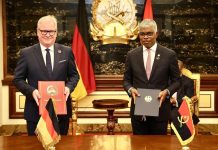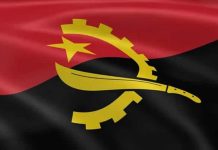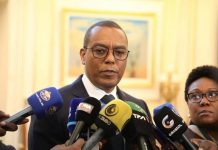Africa-Press – Angola. The draft Legislative Authorization Law that authorizes the President of the Republic, as Holder of the Executive Power, to legislate on the general principles relating to the organization and application of the evidentiary structure of salary scales and remuneration subsidies or supplements for the Civil Service, is being discussed and voting on the 24th of this month.
The information was announced yesterday, by the first secretary of the Board of the National Assembly (AN), Raul Lima, at the end of the meeting of the Conference of Presidents of Parliamentary Groups, which defined the agenda for the plenary sessions of the 23rd and 24th of this month and of the 3rd of March. On the same day 24, the deputies will also discuss and vote, in general, on the Bill on the Extra-contractual Regime for Public Authorities and the Holders of their Bodies, Officials and Public Agents.
On this subject, Benedito Daniel (from the PRS) highlighted the draft law that authorizes the President of the Republic to legislate the general principles relating to the organization and application of the evidentiary structure of salary scales and of subsidies or remuneration supplements for the Civil Service, and the agreement on mobility between the Member States of the Community of Portuguese Speaking Countries (CPLP).
For his part, Alexandre Sebastião André (CASA-CE) added that “the people have been waiting for a long time for an increase or update of the minimum wage”.
Mobility agreement
On the same day (March 24), the National Assembly should ratify the Agreement on Mobility between the Member States of the Community of Portuguese Speaking Countries (CPLP), at the 2nd ordinary plenary meeting.
MPLA deputy João Pinto considered the agreement viable and important for the citizen: “It is an important agreement for young people, especially for those who, with health problems, want to train abroad and, also, to deepen the ties between peoples, respecting the sovereignty of each State.”
For his part, Alexandre Sebastião André (CASA-CE) said that the problem of mobility between the CPLP countries will be resolved, because Angola is already behind in relation to the other States of the community. “It is necessary to create a mechanism so that mobility is not done in an anarchic way. It cannot be a mobility that turns us into a country of immigrants”, he said.
The Agreement on Mobility between the Member States of Portuguese-speaking Countries was signed on 17 July 2021, during the 13th Conference of Heads of State and Government of the CPLP, which took place in the Angolan capital, Luanda.
The legal agreement aims to establish a legal framework that results in the creation of an environment that enhances opportunities and mutual benefits for the peoples of the countries of the Community, with a view to promoting economic, social and cultural development.
It is structured in a preamble and 39 articles that define, among others, the object, the scope of application, the structuring principles, the modalities of mobility in the CPLP, the categories of people, the entry and stay restrictions and the short stay.
The mobility agreement, according to the CPLP, entered into force on 1 January only for Portugal, Cape Verde and São Tomé e Príncipe, which have already delivered the instruments of ratification to the Executive Secretariat of the organization. Guinea-Bissau will then join, which ratified the document on 15 December.
The Community of Portuguese Speaking Countries (CPLP) was created on July 17, 1996, in Lisbon, and is made up of nine member states (Angola, Brazil, Cape Verde, Guinea-Bissau, Equatorial Guinea, Portugal, Mozambique, São Tome and Principe and East Timor).
Facilitating mobility among CPLP citizens is an old aspiration of the Member States and this agreement will contribute to the realization of that ambition, respecting the institutional and regional normative specificities of each country.
The agreement will help to improve and promote cooperation at all levels, namely in economic, cultural, social and academic relations. It is also an essential instrument for the deepening of the community and the progressive construction of citizenship.
Parliamentary agenda
For the 23rd of February, the agenda proposes the draft resolution that creates the Angola/Turkey friendship and solidarity group.
The draft legislative authorization law that authorizes the President of the Republic, as holder of the Executive Power, to legislate on the Social Protection System of the Angolan Armed Forces, the draft resolution on the appreciation of the execution report of the General State Budget for the second quarter of 2021.
Among the documents to be discussed (March 3), the draft resolution that approves, for ratification, the cooperation agreement between Angola and the Democratic Republic of Congo, in the field of Security and Public Order; the ratification of the protocol between the Ministry of the Interior of Angola and the Police Department of South Africa, in terms of Police Cooperation.
For More News And Analysis About Angola Follow Africa-Press






